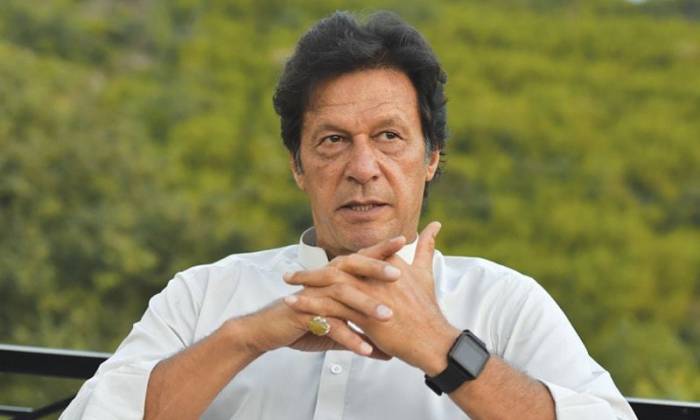The cricketer-turned-politician Imran Khan will become the next prime minister of Pakistan. The vote count was completed three days after the election on July 25, and Khan led his party, the Pakistan Tehreek-e-Insaf (PTI), to victory. A party – or a coalition of parties – requires the support of at least 137 members of the National Assembly to be called upon to form a government. Khan is close to achieving that goal. Having won 115 seats, the PTI should be able to get the support of scores of independents and members of the half-dozen smaller parties. He will likely be sworn in before August 14, Pakistan’s 71st birthday.
Submitting to the counsel of his close advisers and addressing the public as prime minister-elect, Khan said that, having played cricket, he knows the game is not over until the last ball has been bowled. But he subsequently appeared on national television promising a naya (new) Pakistan.
The country has completed one of world’s largest democratic exercises. Altogether, 106 million voters were registered to elect the next National Assembly and four provincial assemblies. Of these, 56 million people (almost 53% of the total) cast their votes. The electorate chose 270 members of the National Assembly. Because two candidates were killed in pre-election violence, voting for two of the directly elected seats was postponed. Sixty women and ten members of various religious minorities were indirectly elected by the four provincial assemblies, bringing the total membership of the national legislature to 342.
Over 3,600 candidates competed for the 272 directly elected National Assembly seats, an average of 13 per seat. This is a good proxy for gauging the state of politics. In less-developed political systems, party discipline typically is too weak to limit the number of people who can contest elections.
The Pakistani political field is crowded in terms of the number of parties, too – another sign of an underdeveloped system. In addition to the PTI, which Khan founded in 1996, two other parties have mass followings. The oldest is the Pakistan Muslim League (Nawaz), which traces its history to 1906, when the Muslim population of British India formed an organization to represent their community’s political and economic interests. Under the leadership of Pakistan’s founder, Muhammad Ali Jinnah, the PML campaigned for the creation of a separate state for India’s Muslim population. Since Pakistani independence in 1947, the party has had several reincarnations; the latest is PML-N, until recently led by former Prime Minister Nawaz Sharif and now by his brother Shehbaz.
The other major political force, the Pakistan People’s Party (PPP), was founded by Zulfikar Ali Bhutto in 1967, after he quit the cabinet headed by his mentor, General Ayub Khan, the country’s first military leader, over differences regarding Khan’s policies on relations with China, India, and the United States.
The recent general election was Pakistan’s eleventh. Until now, only the elections in 2008 and 2013 have been open and democratic. Both led to the peaceful, orderly transfer of power. The 2008 election was won by the PPP under the co-leadership of Asif Ali Zardari, the widower of former Prime Minister Benazir Bhutto, who was killed in December 2007 while addressing an election rally. The PML-N won the 2013 election, with Sharif becoming prime minister. He was ousted in 2017, however, when revelations in the so-called Panama Papers led to criminal charges against him for various financial crimes. Earlier this year, the Supreme Court barred him for life from holding public office, and this month he was sentenced to a ten-year prison term.
This year’s election took place in relative peace, partly owing to the presence of 370,000 troops at polling sites. Though their deployment was also intended to prevent allegations of vote rigging, which Imran Khan and his supporters used to cast a shadow over the legitimacy of Sharif’s government, the defeated parties nonetheless claimed that the election had been tainted.
The PTI’s success resulted from a combination of factors. For starters, the party increased its standing among Pakistan’s urban youth. Pakistan has one of the world’s youngest populations, with a median age of just 25 years, and migration of young men to large cities has swelled the share of young people in places such as Karachi and Lahore to 70-75%. For many of these young people, neither the PML-N nor the PPP met their aspirations, whereas Khan promised well-paying jobs, education, health care, and urban transport. The PTI made major inroads in the megacity Karachi, where its candidates defeated long-established parties.
Khan’s unrelenting focus on corruption also attracted support from young voters. Both Zardari and Sharif were charged with corruption by the National Accountability Bureau, an organization with judicial powers established by General Pervez Musharraf, the country’s fourth military president, to investigate high-level wrongdoing. In his election campaign, Khan drew a link between official corruption and the state’s failure to deliver the goods and services young people want.
The election has brought two other issues to the fore. First, how involved was the military in producing a result that many in the country believe the generals wanted? Second, what are the long-term implications of the judiciary’s aggressive role in state affairs? It will take time to answer these questions. But a consensus has developed that Khan was the military’s favorite. And, with the foreign media largely accepting that assessment, that consensus will shape international perceptions of his government.
Shahid Javed Burki, former Finance Minister of Pakistan and Vice President of the World Bank, is currently Chairman of the Shahid Javed Burki Institute of Public Policy in Lahore.
Read the original article on project-syndicate.org.
More about: Pakistan
















































